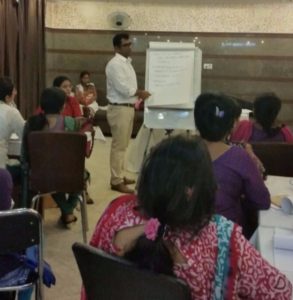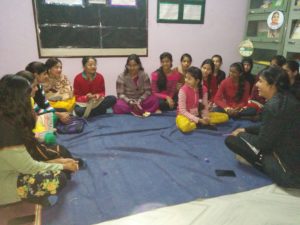Sewa Youth Resource Centre (SYRC) is a space for adolescent girls and young women that SEWA (Self Employed Women’s Association) has created to assist in their overall development as an equal contributor to the economic and social development of the community. The centres, modeled along polytechnics that provide technical courses, facilitate both skill building and vocational training for women trainees with the primary objective of enabling them to become financially independent.
With the support from DFID, SEWA Youth Resource Centres in Delhi, Bihar (Patna, Katihar and Purnea) and Rajasthan (Jodhpur, Jaipur and Bikaner) help in making vocational training accessible to the underprivileged girls. Capitalising on the pressing need for skilled personnel in a growing economy, the centres are designed to provide market-relevant courses in computers, beauty culture, and fashion designing. SYRC is a major initiative of SEWA Bharat as part of their programme for skilling and empowering young girls and women from economically backward families.
In addition to skill development and technical capacity building courses, the centres provide courses on soft skills and life skills. The centres would also facilitate practice and internship during the course to create opportunities for the trainees to have hands-on-experience during training process.
Objective of the Study
 Keeping in sync with the vision of SEWA to enhance the employability of young girls from beneficiary families, the objective of this study was to assess the present structure/ model of SEWA and recommend solutions to strengthen the SYRC processes.
Keeping in sync with the vision of SEWA to enhance the employability of young girls from beneficiary families, the objective of this study was to assess the present structure/ model of SEWA and recommend solutions to strengthen the SYRC processes.
Ranging from the suitability of the existing courses to the administrative processes to the need for more courses and the sustainability of these centres, the recommendations have been charted to help SYRC to strengthen their existing processes as well as provide better opportunities for improving and expanding the employability of their beneficiaries.
The report includes the following sections:
Profile of the beneficiaries, Suitability of the courses, Impact assessment, Review of operations, Sustainability assessment and Recommendations.
Methodology
The broad research questions were-
i.Are the existing technical courses the best suited to improve the employability of the beneficiaries given their unique educational and socio-economic background?
ii.What areas of the administrative systems and processes followed for enrolment, training and placement of the students can be improved and how?
iii.Is there a need to introduce new courses? If so, which courses? How can the centres be made sustainable?
